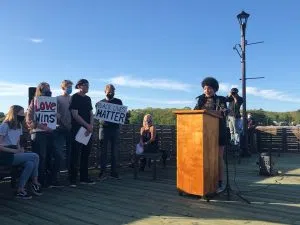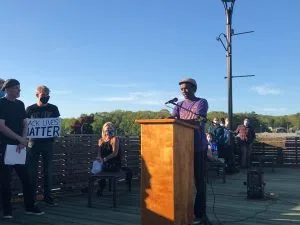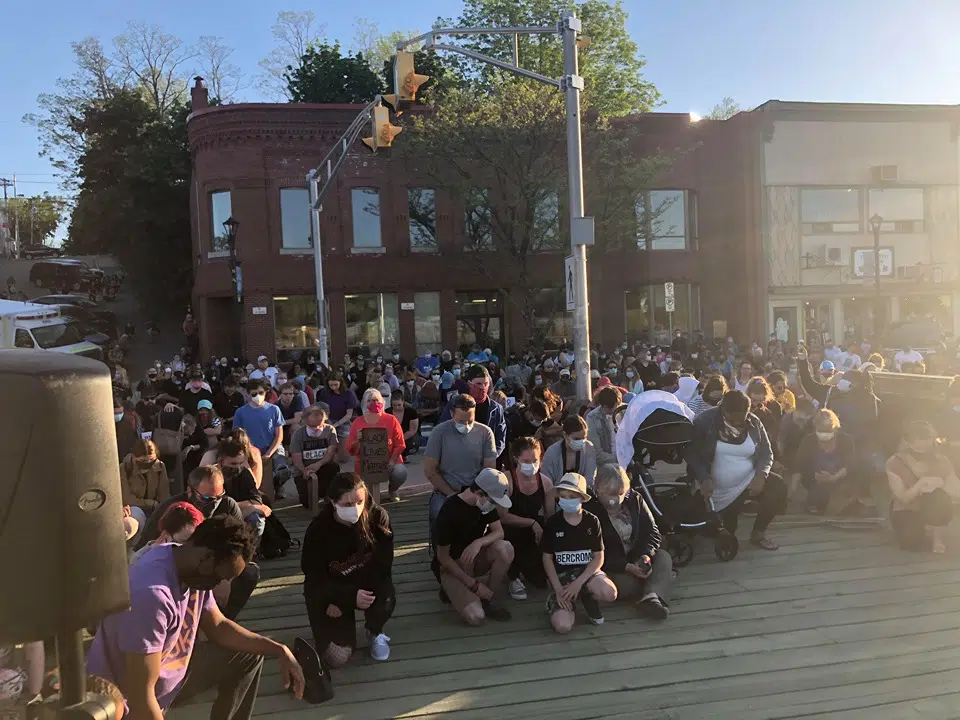Correction: In the original article it was stated that Jordyn Guest had grown up on the South Shore. It now reflects that she lived here for one year and then had to move away due to experiences of racial prejudice. She has since returned to the South Shore and currently resides here.
It can’t just be any rally, that was the overwhelming message from all of the speakers at the Take A Knee Against Racism event in Bridgewater, Thursday evening.
The common theme for each speaker was that in order to have meaningful change, actions and conversations need to take place.
Mayor David Mitchell organized the event, (as a private citizen) but he was quick to hand over the microphone to people who have lived experiences of racism in the community.
The first speaker was Jennifer Everest, who moved to the South Shore about two years ago. In her speech, she said while she hasn’t seen overt racism in her time here based on what she heard from others it does exist.
“I haven’t seen racism in my two years here like what you see on the radio or news but that doesn’t mean it isn’t here.” Everest said.
As someone who has a young child who will grow up in the South Shore as a minority, she wanted to speak to make the community a safer place for her.
“I gave birth to my daughter a year ago at our local hospital, what you’re doing here today is not just for me, it’s for her and all other people who are judged or hurt because they’re black,” she said.

Lauryn Guest addresses the crowd at the Take a Knee Against Racism Event. Photo: Evan Taylor
Lauryn Guest, the youngest of the speakers moved to the South Shore for a year but moved away due to the racial prejudice she experienced. In that time says she has seen too many examples of racism, even walking into a pub with her white friend to people staring at them.
After that, Guest recalled her friend remarking, “I know they weren’t looking at me but did I just experience what you go through every day?”
Guest added most white people on the South Shore will have seen incidents of racist microaggressions. In order to actually affect change on racial issues, people need to be prepared to speak up when they see something wrong.
One of the most moving moments of the event came when she described just a few of the times she’s had to use a strategy she’s developed to stay calm in the face of racism.
“I have had to deep belly breath when strangers touch my hair without consent, I’ve had to deep belly breath as I’m being followed around a store as if my intent was to steal and I’ve had to deep belly breath when people call me racial slurs. Yes, I’m talking about the n-word. I’ve had to deep belly breath when white people dismiss mine and others’ experiences with racism by saying I’m not racist why are you telling me?”
Guest’s speech was met with raucous applause.
She recently moved back to the South Shore where her family lives and says that part of the reason for doing so was to try and help a community she cares deeply about.
Francis Kangata was the final person to speak about his experiences of racism on the South Shore. Kangata said he at first apprehensive about speaking as he didn’t want want to be used as a token black speaker, something he says he’s done in the past.

Francis Kangata addresses the crowd at the Take a Knee Against Racism Event. Photo: Evan Taylor
Ultimately he decided to speak as he was asked to do so by Mitchell, who he feels is committed to making the changes needed to improve racial equality.
Kangata, who was born in Kenya and has been living in Canada for 12 years told the crowd before he moved, he hadn’t seen systemic racism.
“Where I come from it doesn’t exist and while I have a thick skin I worry about my children and how they will have to grow up dealing with these things,” Kangata
He encouraged people to get out and do their own research.
At the beginning of his speech he invited anyone in attendance who wasn’t prepared to speak up and work for racial equality to leave.
“If you’re just here to say you did your part that’s great but you can go, what we need are people who are willing to learn, talk and fight for equality,” he said.
As the speeches concluded, everyone was asked to leave in silence — in what was meant to be symbolic of the last time people walked away from the issues of racism silently.









